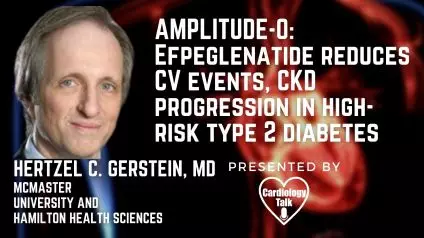Hertzel C. Gerstein, MD @MacDeptMed @McMasterU @PHRIresearch #Cardiovascular #Type2Diabetes #Cardiology #Research AMP...
Hertzel C. Gerstein, MD, MSc, FRCPC, professor and population health institute chair in diabetes research at McMaster University and Hamilton Health Sciences speaks about AMPLITUDE-O: Efpeglenatide reduces CV events, CKD progression in high-risk type 2 diabetes. American Diabetes Association Scientific Sessions.
Link to Article:
https://www.healio.com/news/endocrinology/20210629/amplitudeo-efpeglenatide-reduces-cv-events-ckd-progression-in-highrisk-type-2-diabetes
Data demonstrate that a new GLP-1 receptor agonist decreased cardiovascular event risk by 27% and renal disease progression by 32% in high-risk people with type 2 diabetes, with or without prior SGLT2 inhibitor treatment, when compared to placebo.
The AMPLITUDE-O trial found that weekly efpeglenatide, an investigational exendin-4-based GLP-1 receptor agonist, was safe for high-risk patients and had CV and renal benefits comparable to other human-based GLP-1 receptor agonists in the class, according to data presented at the American Diabetes Association Scientific Sessions and simultaneously published in The New England Journal of Medicine, according to Hertzel. According to him, the study was also the first major CV outcomes trial to evaluate the use of a GLP-1 receptor agonist in a population on background SGLT2 inhibitor treatment, which accounted for 15% of the trial participants.
GLP-1 effects in nonhumans
Four GLP-1 receptor agonists with human GLP-1-like structures have been demonstrated to lower the incidence of cardiovascular events in individuals with type 2 diabetes. The impact of efpeglenatide, an exendin-4-based GLP-1 receptor agonist, on cardiovascular and renal outcomes in high-risk people with type 2 diabetes remains unknown.
Gerstein and colleagues looked at data from 4,076 people with type 2 diabetes, a history of CVD or renal disease, and at least one CV risk factor (mean age, 65 years; 33 percent women; 87 percent white), who were recruited from 344 locations in 28 countries. The average duration of diabetes was 15.4 years, and 90 percent of the participants had previous CVD, with 32 percent having a glomerular filtration rate of less than 60 mL/min/1.73 m2. Researchers randomly allocated patients to receive weekly subcutaneous efpeglenatide 4 mg or 6 mg (n = 2,717) or placebo (n = 1,359), with SGLT2 inhibitor usage (n = 618) stratifying randomization.
The main outcome was a composite of nonfatal myocardial infarction, nonfatal stroke, or death from CV or unexplained causes as the first major adverse CV event.
During a median follow-up of 1.81 years, major adverse CV events occurred in 189 participants (7%) who were given efpeglenatide (3.9 events per 100 person-years) and 125 participants (9.2%) who were given placebo (5.3 events per 100 person-years), for an HR of 0.73 (95 percent CI, 0.58-0.92; P =.0069 for superiority). The HR for efpeglenatide vs. placebo for the secondary expanded outcome of significant adverse CV events, coronary revascularization, or unstable angina was 0.79. (95 percent CI, 0.65-0.96).




